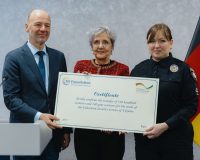In police reform, institutional frameworks and technical training often take centre stage. But sustainable change also depends on people, those who personify professionalism, integrity, and a sense of service. One such individual is Superintendent Gimbia Audu of the Nigeria Police Force (NPF). Her career path is more than an inspiring story. It illustrates the power of values-driven leadership and reflects the long-standing partnership between the GS-Foundation and the NPF in building a more transparent, accountable and citizen-focused police force.
Four Years of Partnership with the Nigerian Police Force
Since 2021 the GS-Foundation has worked closely with the Nigerian Police Force – supporting reform efforts in areas such as training, leadership development, internal accountability, and community-oriented policing. This partnership is built on trust, local ownership and a joint understanding: that lasting reform requires both systemic change and individual leadership.
In practice, our cooperation centres around the following priorities:
- Strengthening leadership: Through targeted leadership trainings, the GS-Foundation works with police leaders to develop strategies for tackling modern policing challenges. A key focus lies on the promotion of female officers into leadership roles.
- Building trust: In a model project in Abuja, community policing is being implemented in practice. The approach includes consistent contact officers, clearly defined patrol areas, and direct communication.
- Training special units: To respond effectively to high-risk situations, a mobile and well-equipped Special Intervention Squad is being developed . It includes tailored training, modern equipment, and a clear operational doctrine.
- Addressing violence against women: The GS-Foundation supports the NPF’s Gender Unit through the establishment of a Gender Lab and the training of Gender Desk Officers to strengthen the institutional response to sexual and gender-based violence.
- Modernising police training: By renovating police training colleges and providing modern equipment, the GS-Foundation helps create a professional learning environment that enhances preparedness and long-term operational capacity.
Superintendent Gimbia Audu has participated in multiple reform-focused initiatives, contributing her voice, her experience and her leadership to training environments and internal peer learning.
Why Police Reform Matters – The Nigerian Context
For many years, Nigeria’s police system has struggled with deep-rooted challenges: limited resources, structural inefficiencies, public mistrust, and concerns around accountability and human rights compliance. Especially during moments of national crisis – such as the #EndSARS protests in 2020 – public attention turned sharply to the urgent need for reform.
In response to these longstanding demands, the Nigerian federal government launched a comprehensive Police Reform Roadmap in 2019. It was developed in consultation with security actors, civil society organisations, and international partners – including the United Nations Development Programme (UNDP) The roadmap articulates a national vision for a modern, professional and service-oriented police force.
Its pillars include:
- Institutional restructuring
- Training and professional development
- Human rights and accountability mechanisms
- Community engagement and trust-building
- Gender-sensitive policing
The GS-Foundation’s engagement with the NPF aligns directly with this roadmap. The foundation acts as a strategic partner, not only providing technical advice, but also supporting the emergence of reform-minded leadership within the force.
From Personal Story to Institutional Commitment
Superintendent Audu’s journey into the NPF began under difficult circumstances. Born in a farming family in rural northern Nigeria in the 1970s, she faced significant social and economic barriers including long interruptions in education and multiple relocations within the extended family. Amid this instability, one thing stood out early: her ability to learn quickly and her determination to build a future for herself and her relatives.
After completing secondary school, with no financial means to pursue higher education, she heard about an upcoming police recruitment round. Driven by a strong personal interest in public service, she went to the Kaduna State Police Command, asked to see the Commissioner, and requested to join the force. Her confidence and clarity left a strong impression. The Commissioner supported her application and facilitated her training.
Audu began her career as a teenage recruit at Police College Kaduna. Despite suggestions that police work might be too difficult for someone of her age or background, she stayed – committed to helping her family and upholding public trust. Throughout her early career, she supported the education of her younger siblings, helped extended family members gain access to training and employment, and remained committed to procedural fairness and ethical conduct.
“My parents told me to stay on the path of truth – and I have held onto that ever since,” she recalls.
Her career progressed through consistent hard work. She was promoted twice ahead of her peers, received informal recognition from local communities for her transparent case handling, and became a role model within her team. Today, she holds the rank of Superintendent and plays an active role in mentoring younger officers.
Her biography is not merely personal. It is a reflection of what can happen when institutional frameworks meet individual determination. Long-term reform partnerships support people like her to thrive, lead and shape future generations.
Integrity as a Cornerstone of Reform
In challenging policing environments, integrity is both a personal stance and a structural goal. Officers like Supt. Audu, who consistently uphold professional standards even under pressure, play a vital role in shifting public perceptions and internal cultures. Her approach to work, characterized by diligence, honesty and care, demonstrates the values the GS-Foundation seeks to embed through its training, mentoring, and institutional support.
Her influence extends beyond her own unit. By supporting younger officers, modelling transparent behaviour and reinforcing the importance of ethical leadership, she contributes to a broader culture of accountability. That aligns with the goals of reform.
Reform Is a Collective Process – but Individuals Matter
Police reform is not driven by single stories. It is the result of joint processes, sustained partnerships and policy-level transformation. Yet individuals matter. Officers like Supt. Audu show what’s possible when personal commitment meets institutional support. Her contributions as a mentor, as a leader, and as an advocate for ethical policing are not isolated acts. They are part of a broader effort, supported by colleagues, partners and reform-minded institutions.
For the GS-Foundation, such voices are essential. They guide the design of programs, shape the culture of training environments and act as bridges between technical content and everyday practice.
Women Leading by Example
As Supt. Audu approaches retirement, her influence continues. For young women in security institutions, her example speaks volumes: leadership is not about privilege, it’s about principles. And reform is not about replacing systems, it’s about working within them to build something better.
In Nigeria and beyond, GS-Foundation is proud to support institutional reform not only through technical expertise, but through the people who embody what change looks like.







